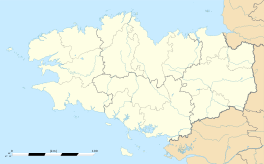Locronan
|
Locronan Lokorn |
||
|---|---|---|

The church square
|
||
|
||
| Coordinates: 48°06′00″N 4°12′24″W / 48.1000°N 4.2067°WCoordinates: 48°06′00″N 4°12′24″W / 48.1000°N 4.2067°W | ||
| Country | France | |
| Region | Brittany | |
| Department | Finistère | |
| Arrondissement | Châteaulin | |
| Canton | Châteaulin | |
| Government | ||
| • Mayor (2014–2020) | Antoine Gabrièle | |
| Area1 | 8.08 km2 (3.12 sq mi) | |
| Population (2008)2 | 800 | |
| • Density | 99/km2 (260/sq mi) | |
| Time zone | CET (UTC+1) | |
| • Summer (DST) | CEST (UTC+2) | |
| INSEE/Postal code | 29134 /29180 | |
| Elevation | 38–280 m (125–919 ft) (avg. 145 m or 476 ft) |
|
|
1 French Land Register data, which excludes lakes, ponds, glaciers > 1 km² (0.386 sq mi or 247 acres) and river estuaries. 2Population without double counting: residents of multiple communes (e.g., students and military personnel) only counted once. |
||
1 French Land Register data, which excludes lakes, ponds, glaciers > 1 km² (0.386 sq mi or 247 acres) and river estuaries.
Locronan (Lokorn in Breton) is a commune in the Finistère department of Brittany in north-western France, with a population of 800.
Locronan is a member of the Les Plus Beaux Villages de France ("The most beautiful villages of France") association.
The village's name means the "hermitage of Ronan", from the Breton lok which means hermitage, and after the eponymous founder Saint Ronan. It has previously been known as Saint-René-du-Bois.
Saint Ronan is greatly venerated in Brittany. He was an Irish Christian missionary of the 6th century who came to the region to teach the people. As his association with Locronan is close, some of his relics are kept in the parish church.
Locronan is a small town built at the foot of a hill. It was granted town status in 1505 by Anne of Brittany, who went there on a pilgrimage.
Since the 15th century, hemp has naturally grown in the area. It was cultivated and processed in a hemp industry in the town at the time, and it was widely used. The town was quite prosperous. Its hemp was exported internationally, as it was used for rigging the ships, both commercial and military, that operated from Brittany's many ports. The Saint Ronan church was built in this period, as well as the small chapel of Penity.
Inhabitants of Locronan are called in French Locronanais.
...
Wikipedia



